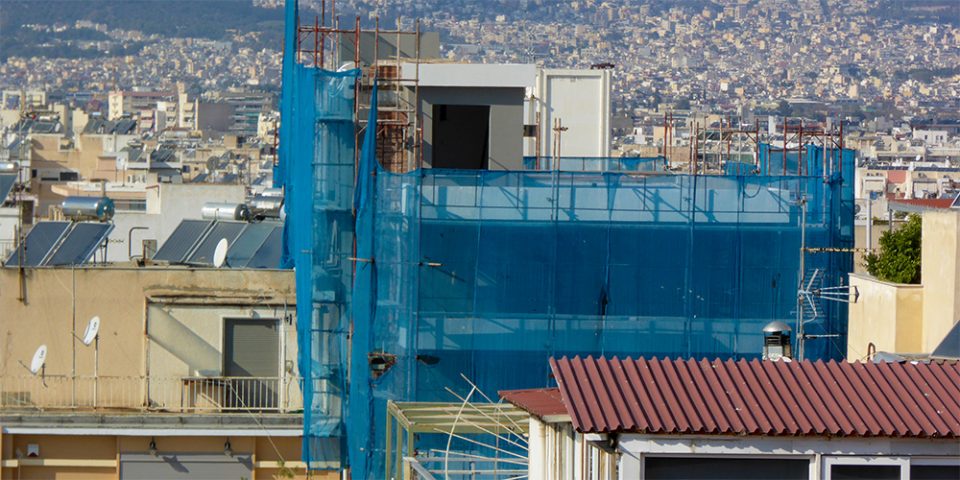As Mr. Andreas Papapetropoulos (of the law firm Andreas D. Papapetropoulos – Evangelia I. Banou & Partners, which filed the petition) stated to ered.gr, the acceptance of the petition paves the way for a retrial on the grounds of unequal treatment, as well as for the pursuit of compensation claims exceeding €1 million.
The case concerns a building permit for the construction of a residence in Alimos, including two underground levels, swimming pools, and a green roof, with a total surface area of approximately 500 square meters and a building height of 21 meters. The permit is now facing complete annulment, as it is among those challenged and still pending trial.
According to the appeal document obtained by ered.gr, the developer is seeking a ruling that the retroactive annulment of the permit—as well as the imposition of financial penalties and restrictions—violates the European Convention on Human Rights (ECHR) and the fundamental principles of the rule of law. The company is also seeking just financial compensation for the moral and material damages suffered due to the annulment.
The Background
The company, active in the greater Athens area since 2014, received approval for the building terms on December 15, 2021, from the Urban Planning Department (ΥΔΟΜ) of the Municipality of Alimos. The permit was granted under the provisions of Article 10 of the New Building Code (NBC, Law 4067/2012), following prior approval by the Architectural Council of the Southern Sector of Athens, which stated in its decision:
“This architectural proposal, both functionally and morphologically, and within the applicable urban planning parameters responsibly implemented by the designer, harmoniously integrates into the cultural environment, urban fabric, local morphology, and development plan. It maintains the environmental benefit stipulated in Article 10(1a) of Law 4067/2012, through reduced building coverage and increased open space.”
Despite the permit’s legality and proper issuance, on May 16, 2022, the Municipality of Alimos—together with its Quality of Life Committee—filed a petition with the Council of State to annul the permit. This action was taken even though the contested permit had been issued by the municipality’s own administrative body, i.e., its Urban Planning Department—an act considered a prohibited intra-administrative dispute under Greek law.
As is known, the Council of State, in Plenary Decision No. 146/2025, ruled that several provisions of Law 4067/2012 (NBC)—specifically Articles 10, 15(8), 19(2), and 25—were unconstitutional. In balancing the principles of legal certainty, predictability, and legitimate expectations against public interest, the Court held that the effects of unconstitutionality do not apply to permits for which construction had demonstrably begun prior to the date of the Court’s announcement (December 11, 2024).
However, the Court clarified that this limitation does not extend to pending legal cases as of that date.
Legislative Response and New Financial Obligations
In response, on May 14, 2025, the Greek Government introduced a legislative amendment to the NBC, establishing an environmental compensation mechanism—or "environmental equivalent"—to offset the environmental impact of the now-invalidated provisions. This mechanism specifically targets building permits either already annulled by final court decisions (such as the applicant's) or those currently undergoing annulment proceedings.
Essentially, the "environmental equivalent" functions as a fine or special levy, payable jointly and severally by property owners and developers to a designated account managed by the Deposits and Loans Fund, for the benefit of the relevant municipality. The exact amount of this financial obligation will be determined by Presidential Decree.
Until full payment of the “environmental equivalent” is made, affected properties will be classified as unauthorized and subject to legal restrictions: they cannot be transferred, nor used in any legal transactions by their owners.
Claims of Unequal Treatment
According to the company, the Council of State's ruling creates unequal treatment between property owners holding identical permits. Those whose permits were not contested in time benefit from the Court’s protective stance as of December 11, 2024, while those involved in pending litigation, such as the petitioner, face full annulment of their permits.
The retroactive annulment of the building permit, the company argues, violates core principles of European and national law—such as the principle of legitimate expectation, legal certainty, and the right to effective judicial protection. Moreover, it seriously infringes on the company’s property rights by classifying the building as unauthorized.
Finally, the introduction of the environmental equivalent and its mandatory payment in connection with permits already issued and utilized violates the principle of non-retroactivity of adverse legal provisions.















